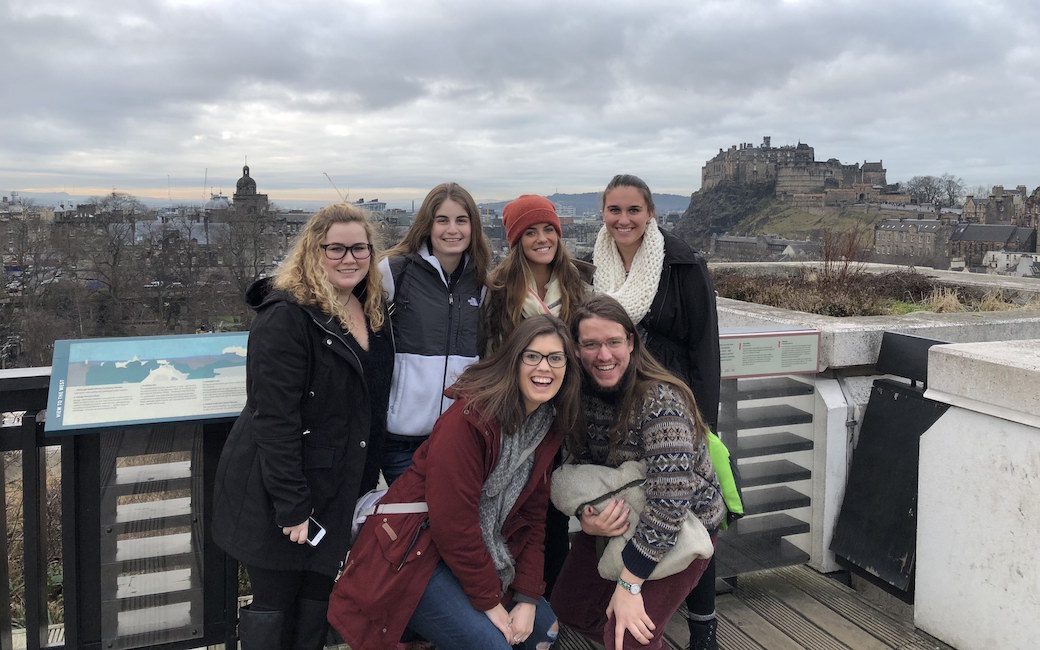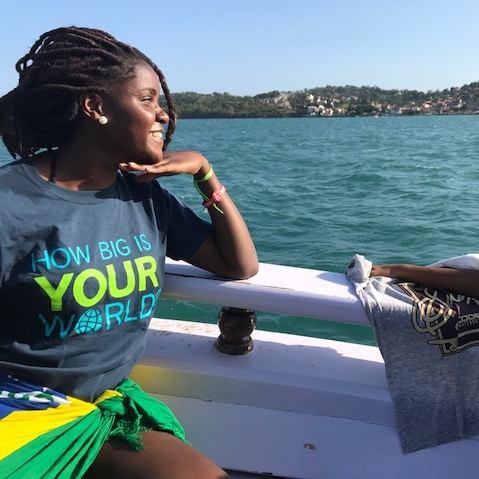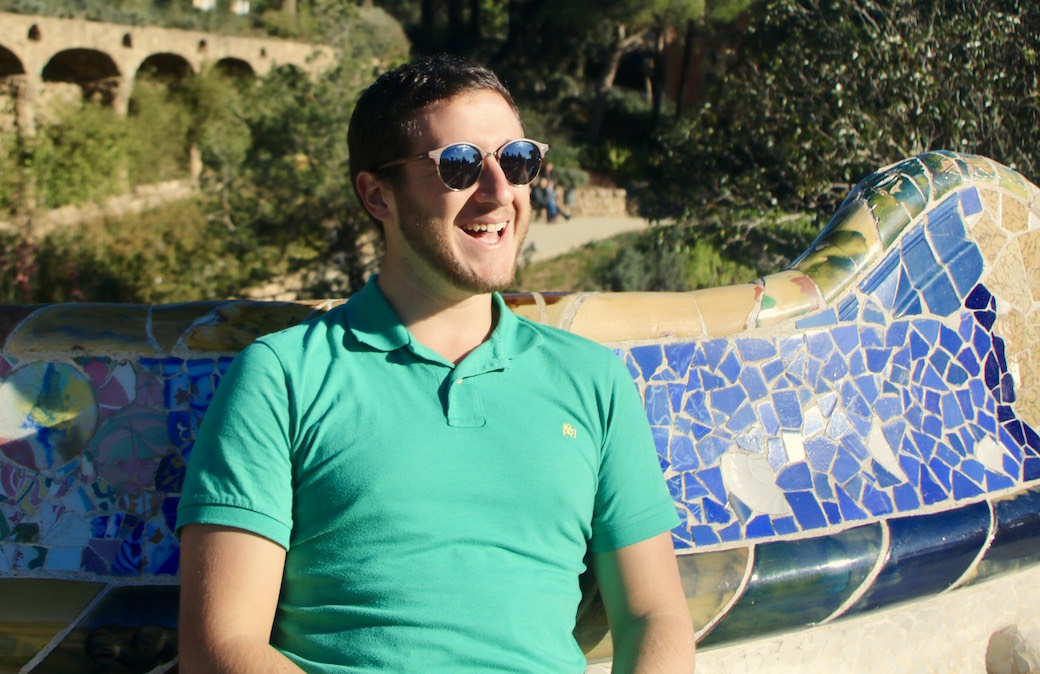Joining the global workforce
Learn how TU Study Abroad prepares students for the workforce and connects them to subject-matter mentors
By Megan Bradshaw on February 7, 2018

Developing global skills and a larger worldview, learning a new language, and broadening personal and professional networks are just a few of the benefits studying abroad offers when it comes preparing for the workforce.
But will you miss out if you can’t go abroad for the traditional semester because of your major’s requirements or your sport’s training schedule?
Towson University students and faculty who have participated in short-term study abroad programs don’t think so.
The length of sophomore Lexi Littlefield’s Identity, Expression, and Social Action in Scotland program fit perfectly into her busy schedule as a communications major and soccer student-athlete. She was able to develop a modified training regimen with her strength coach and temporarily joined the FC Spartans’ practice sessions while in Edinburgh.
Read Lexi Littlefield's blog posts
“There are many other Towson study abroad programs that are held during time periods that don't interfere with Towson sports, such as summer and spring break,” stressed Littlefield. “For those who have any interest in traveling during college, I highly recommend finding a program that works for you. I wouldn't trade the experience for the world.”
The small faculty-to-student ratio during these experiences offers students immediate access to subject-matter mentors.
Jameta Barlow, Ph.D., has led her Gender, Health, and Social Justice minimester course to Ghana twice and plans to offer it again in 2019. She was inspired by her own study abroad experience in that country during graduate school.
“That course was focused on Africana/Black studies, and I always wanted to return to share my experiences with students, but emphasizing a gendered lens,” said Barlow. “What is very unique about Ghana—often called the gateway to Africa—is that its culture represents just some of the diversity on the continent of Africa. For many Black Americans, it is closely aligned with their ancestral roots.
“Further, much of feminism focuses on American and European notions; however, in Ghana, the role of women is very unique, including their power and leadership,” she added. “This is rarely taught. I wanted students to experience this and the role of colonialism in creating patriarchy in Western Africa.”
Her program was packed with service-learning activities that introduced students to local entrepreneurs, craftspeople, farmers, laborers, and students, as well as midwives and health care practitioners and workers.
Monique Easley, ‘17, participated in the first program.
“I think I have grown personally because of this trip in many different ways,” Easley observed. “It has shown me how deep my history goes and I am determined to learn all that I can; and not just learn it for myself, but also teach it to my mentees and other people that are in my life.”
The majority of students from Barlow’s first class are now in graduate school or other training programs such as Teach for America/Peace Corps. She has also co-authored papers, presented at conferences, and had several of her students from past courses have served as research assistants on her projects.
“I do believe the relationships we built and conversations we had while in Ghana contributed to this,” Barlow said. “I look forward to developing future colleagues and this course is a pathway to such endeavors.”
Seniors preparing for the workforce made up 62 percent of TU students going abroad last academic year. Spring 2018 graduate Elssa Kenfack attended a minimester 2018 intensive language program in Salvador Bahia, Brazil.

“As soon as I saw this program, my heart was set on it,” Kenfack said. “For starters, I am a graduating senior in the Honors Thesis program conducting research, and though it is a wonderful opportunity, it restricted me from doing a semester-long program.
“It fit with my major since, in the study of psychology, any and everything involving people, culture and environment is related to the major.”
Kenfack was able to observe and interview the Bahiana people and draw conclusions on micro and macro levels of human behavior.
She is an entrepreneurship minor and is founding an organization called Spark, which will be a non-profit that helps under-resourced youth go on service trips to build relationships with one another and see parallels between where they live and areas around the country and world.
Related: Poster competition win "sparks" Elssa Kenfack to action
“On the day-to-day, I noticed a lot of wealth, health and racial disparities, similar to ones in the US,” Kenfack said. “Seeing all of this reminded me how important the work I hope to do here in the US with Spark. I saw newfound importance introducing the youth to new experiences just based on what I had experienced.”

Senior international business major Davis Kellogg ’18—who is pursuing an economics minor—studied abroad twice, doing an internship in Barcelona in fall 2017.
He worked at Ubiquem Coding Academy in the sales and marketing department, assisting with social media management, English course content and event photography. Kellogg cites the experience as giving him a look into how businesses run in other countries—an important component to his plan to work abroad after Commencement.
Littlefield isn’t waiting for graduation to make a difference.
“The Scottish culture really inspired me to get a better understanding of the political system in the United States,” Littlefield noted. “I found it remarkable how almost every person I encountered was so knowledgeable of their country’s current challenges and how open they were to talk about it with us. It is refreshing to see people so willing to discuss topics that are usually controversial or avoided in the United States.
“The trip definitely influenced me to become a more active member in my society and find my own ways to develop passion and pride for my country,” she added. “Additionally, I would love to continue to learn more about the socio-economic dynamics in other countries to broaden my perspective of the world.”
And she’s looking forward to taking another class this spring with her faculty leader, Cynthia Cooper, Ph.D.
“She challenged every group member to be adventurous and make the most of our experience,” Littlefield recalled. “I think her lecture topics were very intriguing and very easy to connect to real-life situations. I couldn’t have had a better professor!”
If you’re interested in finding out how you can study abroad, visit the Study Abroad Fair website.